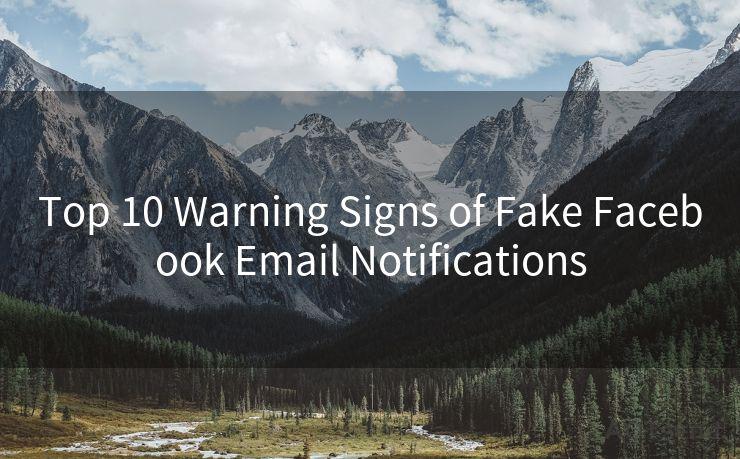Top 10 Warning Signs of Fake Facebook Email Notifications




In the digital age, email has become a primary method of communication, but it also poses risks, especially when it comes to phishing attacks and scams. Fake Facebook email notifications are a common tactic used by scammers to lure unsuspecting users into divulging sensitive information or downloading malware. To help you stay vigilant, here are the top 10 warning signs of fake Facebook email notifications.
1. Suspicious Sender Address
Always check the email address of the sender. Facebook emails typically come from facebookmail.com or fb.com domains. If the sender's address looks suspicious or unfamiliar, it's likely a fake.
2. Urgent or Threatening Tone
Fake emails often use urgent or threatening language to coerce quick action. Phrases like "Your account will be disabled" or "Urgent action required" are common red flags.
🔔🔔🔔
【AOTsend Email API】:AOTsend is a Managed Email Service for sending transactional emails. Support Email Types: reminders, authentication, confirmations, notifications, verification codes, invoices, password resets, account activations, billing statements, two-factor authentication (2FA), and one-time passwords (OTP) emails, etc. $0.28 per 1000 Emails. 99% Delivery, 98% Inbox Rate.
You might be interested in:
Why did we start the AOTsend project, Brand Story?
What is a Managed Email API, How it Works?
Best 25+ Email Marketing Platforms (Authority,Keywords&Traffic Comparison)
Best 24+ Email Marketing Service (Price, Pros&Cons Comparison)
Email APIs vs SMTP: How they Works, Any Difference?
3. Grammar and Spelling Errors
Official communications from large companies like Facebook are usually well-written and proofread. If you notice grammar or spelling errors, it's a good indication that the email is not from Facebook.
4. Unusual Links or Attachments
Hover over any links in the email to check the URL. If it doesn't lead to a legitimate Facebook domain, avoid clicking. Similarly, be cautious of any unexpected attachments, as they may contain malware.
5. Requests for Sensitive Information
Facebook will never ask for your password or credit card information via email. If an email requests such sensitive data, it's likely a scam.
6. Inconsistent or Odd-Looking Design
Fake emails often模仿 the visual style of Facebook emails but may contain inconsistencies or oddities in design. Look for mismatched colors, fonts, or logos that don't match Facebook's official branding.

7. Unsolicited Changes to Your Account
If an email claims to have made changes to your account without your consent, this is a strong indicator of a scam. Always verify any account changes through Facebook's official website or app.
8. Rewards or Prizes Promises
Emails promising rewards, prizes, or other incentives for clicking links or providing information are typically scams. Facebook does not offer such promotions via email.
9. Mismatched or Suspicious Reply-To Addresses
Check the "Reply-To" address in the email headers. If it doesn't match the sender's address or points to a suspicious domain, the email is probably fake.
10. Unsolicited Friend Requests or Messages
Emails claiming to be from Facebook that contain unsolicited friend requests or messages from unknown users are often phishing attempts. Always verify such requests directly on Facebook.
Remember, the Top 10 Warning Signs of Fake Facebook Email Notifications listed above are key to identifying and avoiding phishing scams. Stay vigilant, and don't hesitate to report any suspicious emails to Facebook and your email provider. By being informed and cautious, you can protect yourself from these increasingly common digital threats.




Scan the QR code to access on your mobile device.
Copyright notice: This article is published by AotSend. Reproduction requires attribution.
Article Link:https://www.mailwot.com/p4170.html



